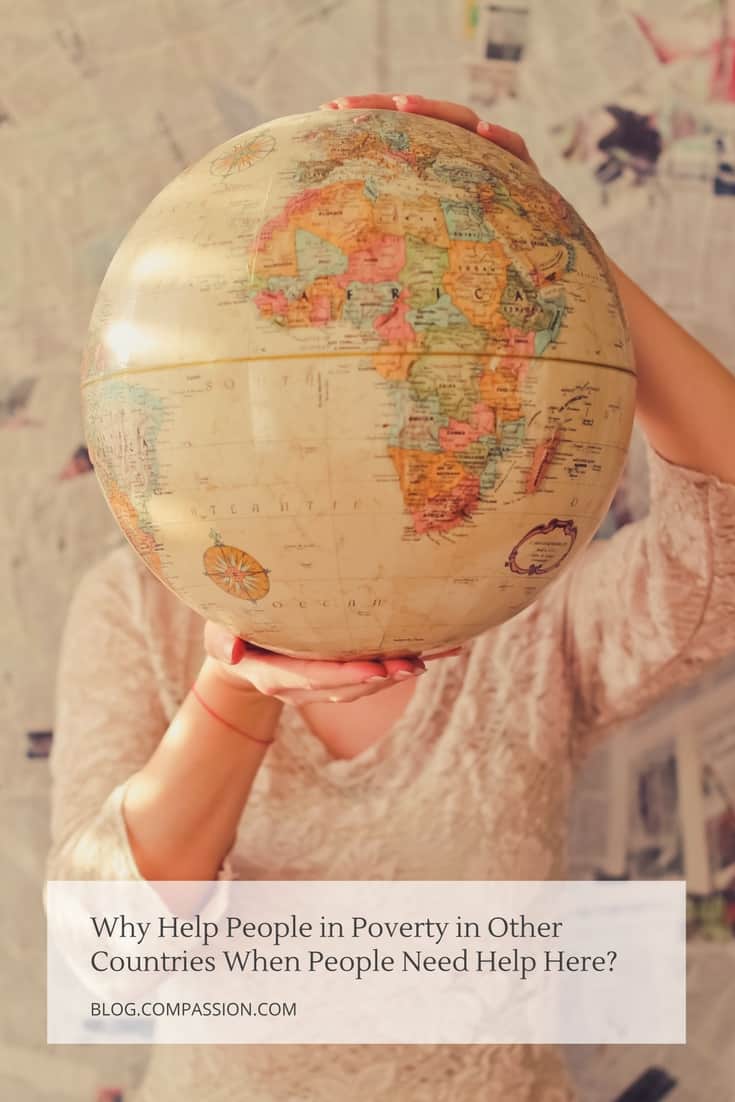Working for a nonprofit that helps children living in extreme poverty in the developing world, I have often heard the question, “Why help people in poverty in other countries when there are plenty of people in poverty right here?”
It’s a good question, and an important one. Our time and resources are finite, yet there seems to be infinite need. We know that the Lord has called us to be kind to people in poverty, and we want to do it wisely.
Here are a few things to consider as you struggle through this question for yourself.

Both/And — Not Either/Or
Sometimes we set up a false dichotomy that we must choose between helping people in poverty in our proverbial backyard and those in need abroad. At Compassion, employees are passionate about helping children struggling through extreme poverty in other countries, but they’re also passionate about and active in their own communities.
They’re involved in foster care, food banks, homeless shelters and in ministries to the elderly, shut-ins and people with disabilities. The same compassion that drives us to help children in other countries drives us to be active participants in our own communities.
Our energy and resources aren’t infinite, so earnestly ask God where the balance lies in your life. We can be present in ministry in our own communities in ways that we can’t be in ministries that are afar.
On the other hand, our money can have significant, lifesaving effects afar that wouldn’t be possible in the same way locally because of the different contexts. For example, $10, which doesn’t go that far in the developed world, can treat parasites or prevent malaria in the developing world and can literally save a life.
Biblical Precedent
One reason to give to other countries as Christians is that Paul directed early believers to do just that.
In 2 Corinthians 8, Paul writes about how he took a collection from the Macedonians to give to churches in other regions who were in need. He urged the Corinthians to follow suit:
“At the present time your plenty will supply what they need, so that in turn their plenty will supply what you need” (v 14).
From the first century, we see Christians giving to help churches in poverty in other regions — even when they themselves were surrounded by poverty. Paul describes the Macedonians as being in “extreme poverty,” or literally “down-to-the-depth poverty.” Yet they were still eager to help Christians in need elsewhere. As the Body of Christ, we are to help the other parts of the body when they are in need.
As Galatians 6:10 says,
“Therefore, as we have opportunity, let us do good to all people, especially to those who belong to the family of believers.”
That’s one thing I love about Compassion: We partner exclusively with local churches. That means when you give to help a child in another country, you’re giving to help a church in extreme poverty meet their needs.
Who Is My Neighbor?
Speaking of biblical precedent, we can’t forget the wonderful, if ubiquitous, story of the Good Samaritan. In Luke 10, Jesus offered up this Samaritan as the ultimate example of fulfilling the commandment to “love your neighbor as yourself.”
When he was asked about the meaning of “neighbor,” Jesus told this story of a Jew who was attacked, robbed and left for dead. The only man who stopped to help him was a Samaritan — a foreigner from a hated religious sect. Jesus made it clear that our “neighbor” isn’t necessarily someone from our hometown or even someone from our own religion.
Different Callings
The needs in the world are great, and none of us can respond to all of them. But God has given each one of us the ability to make a difference.
Ephesians 2:10 says,
“For we are God’s handiwork, created in Christ Jesus to do good works, which God prepared in advance for us to do.”
“Handiwork” implies that we are each created uniquely and differently — we serve different purposes. At the same time, God has prepared good works for us to do. He has prepared ways for me to help others and ways for you to help others.
It won’t look the same for every single person. Some may have a passion to help people struggling with addiction. Others will have the heart to help children affected by poverty. Others will want to help single moms. That’s OK. God loves each of these groups infinitely and needs his people to reach out to them. We each play a different part as we fulfill God’s command of loving our neighbors as ourselves.
The Difference Between Poverty and Extreme Poverty
It’s often a bad idea to compare suffering. There are few things more obnoxious than someone who, when you tell them of a particular ailment of your own, tries to one-up you with their own. Suffering is suffering.
But at the same time, it’s worth asking — is there a difference between poverty in the developing world and the developed world?
“Extreme poverty” is defined by the World Bank as living on less than US$1.90 a day. Many families Compassion serves live on far less than even this.
In some rural areas of Uganda, for example, some families live on the equivalent of $8 a month as subsistence farmers. If their crop is good, they eat. If it is not, they don’t. They don’t have access to safe water so the children might get typhoid, dysentery or cholera. When their children are ill, they cannot afford to pay for treatment. They also have no means of transportation to take them to a clinic when they are sick. There sometimes aren’t government safety nets in place to help when the worst happens.
And, thus, millions of children die in the developing world due to easily treatable causes that do not kill children in the developed world.

When it comes to school, many governments provide education, but parents have to provide uniforms, books and fees — as they do in many developed countries as well. What is difficult to provide for many low-income families in the developed world is completely impossible to provide for parents who earn only 50 cents to a dollar or two a day. And thus, children are left uneducated and perpetuate the cycle of poverty.
The scale of the problem is also a factor to consider. In the U.S., about 15% of people live below the poverty line, defined as $12,880 a year for one person. Compare that to Haiti, where 58.5% of the population lives on less than $1.90 a day.
The U.S. government is able to provide some services as a safety net that many developing countries can’t (or won’t). That doesn’t mean we shouldn’t help people in poverty here — we definitely should! But it makes a compelling case for also caring for people who are in desperate situations elsewhere.
We know that we serve a God who has deep compassion for people living in poverty. We pray that God would guide you, as you love your neighbor as yourself — both near and far.
This article was originally published on July 17, 2017. It has been updated with the latest statistics available.







14 Comments |Add a comment
Yes, thank you so much for addressing this question for so many of us with such grace, truth and sensibility. The enemy would love to keep us distracted with this “false dichotomy” thinking. I am more confident and resolute in giving both at home AND abroad.
Thank you, this could be good to share with someone who lacks this important perspective. It is sad that people have such ingrained misconceptions about how much tax money goes outside our borders (very little if you set aside military spending) and the comparative depth of suffering (people think we still have starvation in the US.) While being ready to help any neighbor, Christians are called to identify who the “least of these” truly are, and that identification process should be a loving one with all our heart, soul, and mind.
Yes I have believed all this article states for years…so so many in undeveloped countries don’t have simple basic needs…we are blessed in the US, with so much more, I do think even those living in poverty. We must help all if we can.
Thanks Amber for such an instructive and comprehensive response to a difficult question. One that I’m sure lingers in may well meaning and loving people.
How many letters do you get from your child? I have been a sponsor for 4 months and have only had 2 responses and those were at the very beginning. I have heard of some crisis in the area of my child that I sponsor I am hoping to learn that the center and the child and family are ok. It is discouraging and upsetting not to hear anything from the center at all.
Hi Tammy! I am really sorry that you have not been receiving many letters from your sponsored child. I understand and appreciate your desire to truly connect with your child in your letters.
We have implemented a reciprocal letter writing program in the last few years. This means that your child will write to you, every sixty days, after they receive a letter from you. If you write to your child consistently (at least once every two months), you may expect to receive letters about six times each year.
We are so thankful for sponsors like you who are committed to Compassion’s ministry and their sponsored child. We would not be able to release children from poverty in Jesus name without your hard work and involvement in the ministry. We acknowledge that it can be difficult to receive letters only a few times a year, but our main priority is what is best for the children in our program. We truly believe that the reciprocal letter writing program will improve a child’s relationship with their sponsor as well as their development within our program while maintaining our commitment to stewardship.
Can you send more than just letters to the child you sponsor? For example gifts( crocheted doll/ teddy or crocheted basket, crochet mini purse, crocheted blouse or dress etc), store bought clothes, hand drawn pictures, pictures, birthday presents?
Hi Marilyn! You are welcome to send small, flat paper items with your letters. To ensure your child receives everything you send, your letters and small gifts must be “scan friendly.” This means: items cannot be larger than 8.5″ X 11″ or smaller than a business card. The total number of items cannot exceed six sheets of paper, including the letter. Items in excess of six sheets will be discarded or donated at the discretion of Compassion’s child correspondence staff. Also, please label all pieces with your sponsor number and child’s number.
The following is a list of the most popular items that can be sent and will be digitally sent:
Postcards, greeting cards, pages from coloring books, blank stationery pieces (no envelopes), handmade paper crafts or card, and appropriate photos of you and your family. Children love receiving these gifts that are simple reminders of their sponsor’s special love for them.
The following items may also be included with your child’s letter and will be physically delivered to your child:
Stickers (includes puffy, glittery and 3D), bookmarks, and musical greeting cards. Please note that physical items sent will take 2-3 month to be delivered.
Due to strict regulations, please do not send: ornaments, hair ribbons, elastic hair bands, magnets, odd shaped items, balloons, glass or ceramics, anything containing metal, clothing of any kind, perishable items (gum, candy, flower seeds), large items (soccer balls, toys, etc.), books (even small books), booklets, DVDs or CDs, plastic rulers, tassels, stencils, jewelry, coloring books or watercolor paint books, or foam crafts. Ineligible items that are sent will be donated to a local charity.
If you prefer your child to choose an item from their own community, you can send a monetary gift: birthday gift, family gift or general gift. This gift will be used to purchase an item from your child’s community to help their situation. Please let us know if you have any questions!
I always wonder that to “Why should I help someone in a land far away that I can’t see? When there are children, teens, and even adults staving daily in the streets of the greatest nation in the world USA?!” I may never know the answer to those questions? But if I and anybody I know would just sponsor at least 1 child things will change. Like Jesus said, “If you do it unto the least of these you’ve done it unto me.” Honey Louise Lobdell
Hi Honey! Thank you for your obvious heart to see the value of those in need and for raising this question. There are organizations and church networks in the U.S. that are serving needs in a local context more effectively than we ever could. Our focus is in developing regions serving children who live on less than $1.90/day, in which poverty often means the difference between life and death, because that is where we, as an organization, can be most effective. We agree that poverty causes vulnerability all over the world – the U.S. included. Thank you for your heart to dig in and serve where you see need. God bless you!
This is excellent. Only sorry I didn’t read it sooner. Thank you
Excellent! Thank you for this well written answer to a tough question. Very helpful!
I am blessed by it
Thank you Amber! I hear this question a lot when I am volunteering at events. I always try to let people know that Compassion has chosen to work through local churches in the developing world to make an eternal impact for children growing up in extreme poverty. But that doesn’t mean that if you have a passion for another area of need, I am sure there are organizations that people can partner with to help in that area. You have made many great points here that I will certainly try to remember the next time I hear this question.